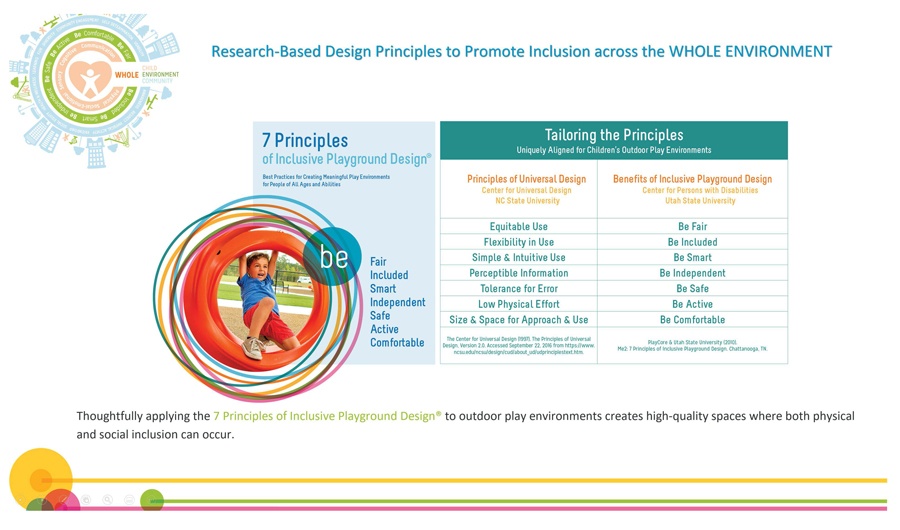When designing an inclusive playground why not use evidence-based research to create outdoor play environments and experiences that address the physical and social inclusion of people of all ages and abilities? That’s exactly what CR Studio Design does. Using PlayCore’s educational resources for inclusion best practices and a national partnership grounded in research, we can assist our clients design playgrounds that move beyond the minimum accessibility guidelines to provide inclusive, multigenerational play destinations that encourage active, independent and meaningful play for everyone.
The Me2sm: 7 Principles of Inclusive Design® and 2 Play Together: Fostering Friendship Through Inclusive Play are PlayCore’s comprehensive companion programs used to address the needs of the whole child and creating meaningful play experiences. These evidence-based research principles were developed through a partnership with leading experts like Utah State University’s Center for Persons with Disabilities and Lekotek.
While we know no two universally designed playgrounds are alike, we do know children want to “Be” and feel fair, included, smart, independent, safe, active and comfortable during play. The 7 Principles of Inclusive Playground Design focus on the usage of individual play activities as well as the context of overall environmental design. By aligning the design principles and the specific guidelines and considerations, we can create whole environments that support the active participation of all people, of all ages and all abilities.
Let’s take a closer look at these seven principles in action.

1. Be Fair
Being fair means ensuring equitable opportunities for children of all ages and abilities. To achieve this, playground designers must consider the play needs of all users. Inclusive playground equipment helps to create a more “fair” play setting where all kids have something to do.
2. Be Included
Inclusive playground equipment provides equitable opportunities for all children, but good playground design takes things even further. How? By considering how children will interact with each other once they arrive at the playground. Dramatic play structures like playhouses encourage social interaction among children.
3. Be Smart
A well-organized playground provides endless opportunities for active and passive play. This allows families to spend more time at the park, and for children to engage in longer play interactions. Well-organized playground designs with appropriate signage and comfortable amenities all contribute to “smart” play spaces.
4. Be Independent
One of the things that parents love most about the park is sitting back and watching their child play. With an inclusive playground design, kids are able to play independently by themselves or with other children. Inclusive equipment, ADA-compliant playground safety surfacing and elevated ramps allow children to venture out on their own.
5. Be Safe
Elaborating on the above point, inclusive playground designs must have accessible routes, elevated ramps and protective surfacing to accommodate kids with disabilities. Inclusive playgrounds must also meet the required safety standards, such as making sure equipment is properly spaced out and that guardrails are present on elevated surfaces.
6. Be Active
An active playground offers a wide variety of playground equipment to meet a diverse set of physical needs. For example, an inclusive swing seat is good exercise for the legs while ropes are good for the upper torso. An inclusive playground might also have cozy, quiet spaces for kids on the autism spectrum, and musical instruments, spinning seats or a roller slide for those who enjoy sensory play.
7. Be Comfortable
And finally, all playgrounds should have comfortable amenities like shade structures and seating to make their stay pleasant. When playgrounds offer these types of amenities, people are more likely to visit often and stay longer.
These seven principles should be included in all inclusive playground designs. They ensure that all children can play together, side by side, regardless of their physical or mental abilities. Designing inclusive playgrounds based on research backed principles ensures social inclusion between children of all abilities outdoors while celebrating their similarities as well as their differences. CR Studio Design can offer professional development CEUs on inclusion as well as other topics including Placemaking. To learn more on inclusive playground design or other professional development topics contact CR Studio Design.
